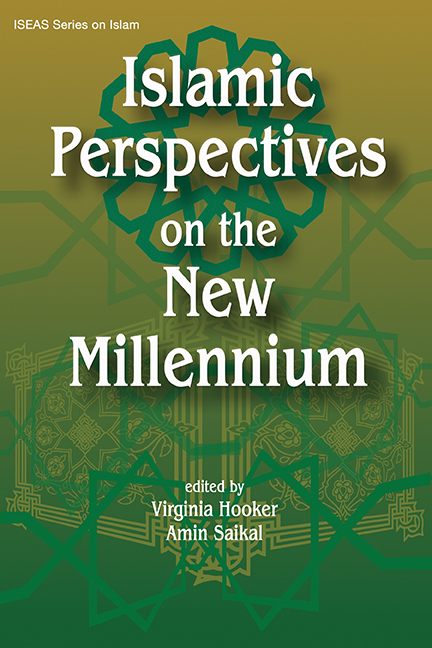Book contents
- Frontmatter
- Contents
- Acknowledgements
- Contributors
- 1 Islamic Perspectives on the New Millennium
- The New World Order
- The New Age
- The Economy
- The Nation-State
- Muslim Women
- Law and Knowledge
- 12 Perspectives on the Shari'a and the State: The Indonesian Debates
- 13 The Role of Muslims in the New Millennium
- Conclusion
- Glossary
- Index of Names
- Index of Subjects
13 - The Role of Muslims in the New Millennium
from Law and Knowledge
Published online by Cambridge University Press: 21 October 2015
- Frontmatter
- Contents
- Acknowledgements
- Contributors
- 1 Islamic Perspectives on the New Millennium
- The New World Order
- The New Age
- The Economy
- The Nation-State
- Muslim Women
- Law and Knowledge
- 12 Perspectives on the Shari'a and the State: The Indonesian Debates
- 13 The Role of Muslims in the New Millennium
- Conclusion
- Glossary
- Index of Names
- Index of Subjects
Summary
We have just emerged from an American century, whatever that means. It could have been a German century had the Allied forces lost the Second World War, or a Japanese century had Hiroshima and Nagasaki been spared the atomic bomb. What happened, of course, happened by the will of Allah. The point is that military superiority was one of the deciding factors in the determination of world power on the cusp of the present millennium.
What about this new millennium? It could be an Asian millennium — and by Asia, of course, Australia is included. For Muslims, there is nothing very special about the new millennium. It will merely continue an arbitrarily defined periodization and pose even greater challenges for Muslims in particular and the world in general. However, Islam could be a unifying force for the entire world, in the sense that it could be used to foster a meaningful relationship between Muslims and non-Muslims. To wield such a force, Muslims must be advanced in all fields.
In this chapter I will discuss the challenges that Muslims face in the new millennium. There is a need to resolve the issue of the reconstruction of knowledge in line with the Islamic vision so that this knowledge can be fully utilized for the needs of the ummah. In Islamic universities this is being achieved by integrating courses on revealed knowledge (such as Fiqh and Usuluddin) with human and physical sciences courses. While being prepared for professional careers, students are also being exposed to the religious vision. Muslim intellectuals were preoccupied with this issue in the last quarter of the twentieth century. The effort to reconstruct knowledge is in line with the need to produce professionals in all fields who are morally upright. There is also a need to reduce friction among Muslims. In this context, the ummah should not be divided by trivial differences, and the ummatic vision should be fully exploited. Moreover, there is a need for non-Muslims to understand more about Islam, which will bring them into a closer and more meaningful relationship with Muslims.
- Type
- Chapter
- Information
- Islamic Perspectives on the New Millennium , pp. 221 - 228Publisher: ISEAS–Yusof Ishak InstitutePrint publication year: 2004

